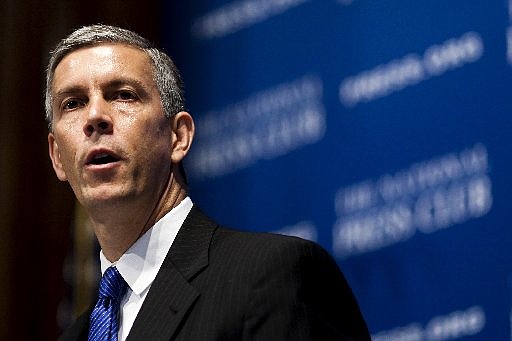Tennessee and Georgia schools will have more failing schools in the coming year as states toughen testing standards under the federal No Child Left Behind act, officials say.
Already, both states now list about a quarter of schools as failing. U.S. Secretary of Education Arne Duncan predicts 82 percent of the nation's schools could have that same designation when another round of standardized test results are released this fall.
Testifying before Congress this week, Duncan said that, based on his calculations, students increasingly won't be able to achieve the lofty benchmarks established by President George W. Bush's No Child Left Behind Act.
The act sets requirements for achievement in reading, math and language arts, as well as graduation rates. Those requirements get tougher over time, and schools that don't meet them, even if they show some improvement, are penalized. No Child Left Behind seeks to have 100 percent of students performing to standards by 2014.
Instead, Georgia and Tennessee schools fall farther and farther behind each year, figures show, as the states increase requirements.
In the 2008 school year, 18 percent of Tennessee schools were listed as failing. This year, the number swelled to 34 percent.
Georgia saw its failure rate grow from 17 percent in 2007 to 22 percent in 2010, state reports show.
Duncan told Congress 34 percent of most U.S. schools now are considered failing. He has calculated that even if most of the nation's schools improved as much as the top 25 percent, their scores would still not meet the increasing benchmarks over the next four years.
Duncan wants No Child Left Behind reformed, and so do Georgia officials.
"Every year, our academic bar goes up ... and while progress is being made, if it isn't made as quickly as that bar goes up, then schools are deemed as failing," said Matt Cardoza, spokesman for Georgia Department of Education.
"We've always said we anticipate a decline in student achievement scores because of our increased standards," said Amanda Maynard Anderson, spokeswoman for the Tennessee Department of Education. "We anticipate more schools to enter the accountability pipeline, or move further along the NCLB scale. We anticipate that will continue to happen."
The scale starts at "needs improvement" after one year. After several years failures the scale requires state intervention.Anderson says students and teachers need time to adjust to more rigorous standards, but Georgia officials want sweeping reforms to No Child Left Behind as President Barack Obama seeks to reauthorize the measure.
"A lot of our schools saw improvement from year to year, but it wasn't enough to keep up with the academic bar," Cardoza said. "We're right there with many other states asking Congress to reauthorize [No Child Left Behind] and look at new measures. We know our schools are making great progress, but the current accountability system ... it's not adequately represented."
Obama's reform plan would reward high-poverty schools that show improvement. States and districts would identify and step into schools that fail over and over. For schools that make some progress, local leaders would have flexibility on improvements.
"Our proposal will offer schools and districts much more flexibility in addressing achievement gaps, but we will impose a much tighter definition of success," Duncan said to Congress. "Simply stated, if schools boost overall proficiency but leave one subgroup behind - that is not good enough. They need a plan that ensures that every child is being served."
